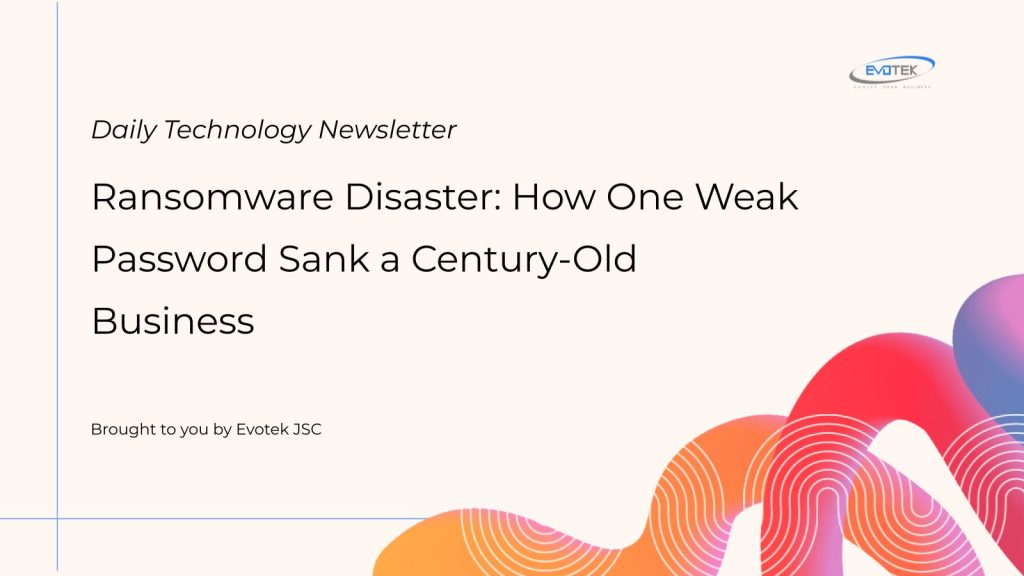A single, compromised password is believed to have been the vulnerability that led to the collapse of KNP, a 158-year-old Northamptonshire transport company, leaving 700 people without jobs. This devastating incident underscores the escalating threat of ransomware attacks plaguing businesses across the UK.
KNP, which operated 500 lorries primarily under the Knights of Old brand, is just one among tens of thousands of British enterprises targeted by cybercriminals. Recent months have seen major players like M&S, Co-op, and Harrods also fall victim, with the Co-op’s chief executive confirming that data belonging to all 6.5 million of its members was stolen.
The KNP Cyber Attack: A Single Point of Failure
In KNP’s case, the insidious Akira hacker group reportedly gained access to the company’s computer systems by simply guessing an employee’s password. Once inside, they encrypted KNP’s data and locked its internal operations, bringing the business to a standstill.
Paul Abbott, a director at KNP, revealed the agony of the situation. He chose not to inform the specific employee whose password was likely the entry point, questioning, “Would you want to know if it was you?”
The ransom note left by the attackers was chilling: “If you’re reading this it means the internal infrastructure of your company is fully or partially dead…Let’s keep all the tears and resentment to ourselves and try to build a constructive dialogue.” While no specific price was named, a specialist negotiation firm estimated the demand could have reached £5 million. KNP, however, lacked such funds. Ultimately, all data was lost, and the company was forced to cease operations.
National Efforts Against a Growing Threat
The National Cyber Security Centre (NCSC), part of GCHQ, strives to make the UK “the safest place to live and work online,” dealing with a major cyberattack daily. According to “Sam” (not his real name), who leads an NCSC team, hackers aren’t inventing new tactics; they simply seek “a weak link” or “organisations on a bad day.”
NCSC operatives use intelligence to identify and eject hackers before they can deploy ransomware. “Jake” (not his real name), a night duty officer, described the “thrilling” satisfaction of successfully averting such disasters. Yet, the NCSC admits it offers only one layer of defense against a highly lucrative and rapidly expanding criminal enterprise.
The Escalating Tide of Cybercrime
Reliable statistics on cyberattacks are elusive because companies are not obliged to report incidents or ransom payments. Nevertheless, government surveys suggest an estimated 19,000 ransomware attacks struck UK businesses last year alone. Industry research indicates the average UK ransom demand is approximately £4 million, with roughly a third of companies opting to pay.
Richard Horne, CEO of the NCSC, acknowledges a “wave of criminal cyber-attacks” but denies criminals are winning. He insists, however, that businesses must significantly improve their cybersecurity measures.
When prevention fails, the National Crime Agency (NCA) steps in to pursue the offenders. Suzanne Grimmer, who heads an NCA unit, notes that incidents have almost doubled to 35-40 per week since she took over two years ago. She predicts 2024 could be the “worst year on record for ransomware attacks in the UK.”
New Tactics, New Generation of Hackers
Hacking is becoming increasingly accessible, with some tactics not even requiring advanced computer skills. Methods like social engineering – phoning an IT helpdesk to trick them into granting access – have lowered the entry barrier for aspiring criminals. Ms. Grimmer highlights that “These criminals are becoming far more able to access tools and services that you don’t need a specific technical skill set for.”
James Babbage, Director General (Threats) at the NCA, points to a younger generation of hackers, often introduced to cybercrime through gaming, who leverage their social manipulation skills to exploit help desks and gain company access. Once inside, they can deploy ransomware, often purchased on the dark web, to steal data and lock systems. Mr. Babbage labels ransomware “the most significant cyber-crime threat we face… a national security threat in its own right.”
Strengthening Digital Defenses: A National Imperative
Warnings about a potential “catastrophic ransomware attack at any moment” have come from Parliament’s Joint Committee on the National Security Strategy, while the National Audit Office described the threat to the UK as “severe and advancing quickly.”
Both Richard Horne of the NCSC and James Babbage of the NCA stress the critical need for companies to integrate cybersecurity into every decision they make. Mr. Babbage also strongly discourages paying ransoms, stating, “it is the paying of ransoms which fuels this crime.” The government is even considering banning public bodies from paying ransoms and requiring private companies to report attacks and seek government permission to pay.
Back in Northamptonshire, KNP’s Paul Abbott now tours, sharing his company’s cautionary tale with other businesses. He advocates for mandatory “cyber-MOTs” where companies must prove their IT protection is up-to-date. “There needs to be rules that make you much more resilient to criminal activity,” he asserts.
However, many companies, facing the existential threat of losing everything, are choosing to pay criminals without reporting the incidents, as noted by cyber-specialist Paul Cashmore, who was brought in by KNP’s insurers. He concludes grimly, “This is organised crime. I think there is very little progress against catching the perpetrators, but it’s devastating.” The story of KNP serves as a stark reminder of the devastating real-world consequences of inadequate digital security in an increasingly connected world.

 日本語
日本語 한국어
한국어 Tiếng Việt
Tiếng Việt 简体中文
简体中文